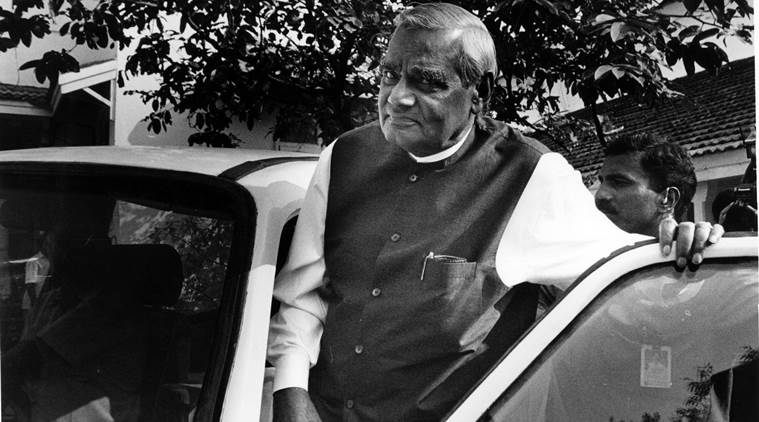View from the Right: Remembering Atal Bihari Vajpayee
The editorial in Organiser says, “Though he was often referred to as the ‘right man in the wrong party’, he was never ashamed of his core convictions and the inspiration he had taken from the Rashtriya Swayamsevak Sangh (RSS).”
Updated: August 22, 2018 12:30:42 am

Atal Bihari Vajpayee
Former Prime Minister Atal Bihari Vajpayee, who passed away last week, is on the cover of both Organiser and Panchjanya and both weeklies have carried a number obituaries of the BJP founder. The editorial in Organiser says, “Though he was often referred to as the ‘right man in the wrong party’, he was never ashamed of his core convictions and the inspiration he had taken from the Rashtriya Swayamsevak Sangh (RSS).” Organiser has also carried an excerpt from L K Advani’s memoir, My Country, My Life. Advani describes Vajpayee as “a statesman with a poetic soul”. Advani also recalls his memories of Vajpayee and their long political association. Advani wrote that the party’s debut performance in 1984 Lok Sabha elections was dismal — it won only two seats and Vajpayee was defeated in Gwalior. “The BJP’s subsequent trajectory of meteoric growth was due to the Ayodhya movement. It was the time when Atalji chose to remain relatively inactive. However, I have never had any doubt — that the party’s journey from the failure to form a stable government in the Centre in 1996 (when Atalji was prime minister for thirteen days) to the success to do so again in 1998, was mainly due to his personal popularity that transcended the party’s support base,” Advani wrote.
Ashok Tandon, who was media advisor to Vajpayee, in his article in Organiser calls the former PM a great consensus builder. He writes, “In his death, Bharat has lost its anmol ratna, South Asia an apostle of peace and the world a visionary statesman par excellence”.
Panchjanya too pays rich tribute to Vajpayee by highlighting his poetic and oratorial skills and the work of his government. Panchjanya has carried excerpts of various interviews the former PM gave the weekly during his tenure in office. In reply to one question, Vajpayee said that the nuclear tests carried out in Pokhran was most the satisfactory achievement of his government.
Somnath’s way
Organiser has published an obituary of former Lok Sabha Speaker Somnath Chatterjee as well. The obituary claims that Chatterjee, who was born in a household which celebrated the “dharmik” polity, died a non-communist. Between these two extremes, he remained a statesman who could not be encompassed within the “party-line”. The obituary says that Chatterjee was born and brought up in a nationalistic environment, he joined the Communist Party of India (Marxist) in 1968 and was expelled from the party in 2008. It claims that in their condolence message, the CPM has confirmed that Chatterjee breathed his last as a non-communist patriotic Bharatiya.
On July 20, 2008, Chatterjee was the Speaker when his party withdrew its support to the UPA government. The CPM, the article recounts, instructed him to resign. Chatterjee rejected the directive and presided over the discussion in the House on the Indo-US nuclear deal. “Somnath Chatterjee made history by becoming a true believer of parliamentary democracy, yet being a Communist. He expressed the fundamental lessons of the democratic system, the position of Speaker is ‘independent and unbiased’”, the obituary claims.
House in order
An article in Organiser about the recent monsoon session of Parliament says that it was the most productive session since the year 2000. “A citizen commentator has hit the nail on the head and pointed out that the Opposition does not allow the government to talk in Parliament. All they do is shout slogans, walk out, storm the well of the house and create a ruckus. Then they complain about not getting time, how will debates happen… do they have patience to listen to answers? This session was different,” reads the analysis, which attempts to buttress its claims with statistics: The monsoon session (July 18-August 10, 2018) of the Lok Sabha witnessed 17 sittings. According to data compiled by the PRS Legislative Research, 20 bills were introduced and 12 were passed. The Lok Sabha worked for 110 per cent of the scheduled hours and the Rajya Sabha for 66 per cent. The Lok Sabha and Rajya Sabha spent 50 per cent and 48 per cent of their time on legislative business respectively. The government was successful in getting two critical Bills passed in Rajya Sabha — to give constitutional status to National Commission for Backward Classes and amendment to the Constitution to restore the existing law against atrocities on SCs/STs. “Indeed, the BJP dominated the session: it was only during the no-confidence motion that Rahul Gandhi briefly ensured that the spotlight was on him. But he lost the momentum after that. Neither was the Opposition able to showcase Rafale issue to score a point,” concludes the article.
Compiled by Lalmani Verma






































No hay comentarios:
Publicar un comentario